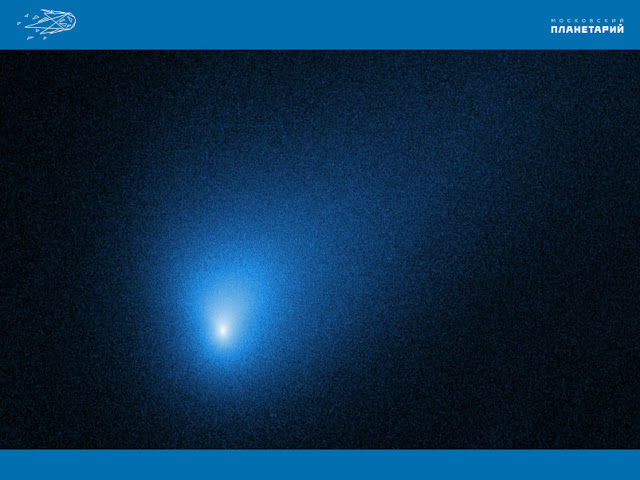Moscow Planetarium logo.
July 19, 2021
Cosmic bodies that are not gravitationally associated with any star are called interstellar objects. They exist in the space between the stars. The first discovered interstellar object was the asteroid Oumuamua. The first discovered interstellar comet was the comet Borisov (2I / Borisov). It was discovered by amateur astronomer Gennady Borisov on August 30, 2019 at his personal observatory in the village of Nauchny in the Bakhchisarai region of Crimea. This caused a sensation in world astronomy.
Borisov's comet. Photo of the Hubble telescope, October 12, 2019
At the time of discovery, the comet was at a distance of 3 AU. from the Sun, and its magnitude was 17.8m. Observations of the comet's movements from other observatories confirmed its hyperbolic orbit. This means that she flew to us from outside the solar system. In October 2019, the Hubble telescope observed the comet. Then the most detailed image to date was obtained.
In December 2019, the ALMA radio telescope, located in the Chilean Atacama Desert, discovered that the gas escaping from a comet contains very large amounts of carbon monoxide - 17 times higher than its average content in comets in the solar system. Using the RC600 telescope installed at the Caucasian Mountain Observatory of Moscow State University, scientists have found that the comet's gas and dust tail contains a lot of silicate dust.
Image above: Comparison of the orbits of the interstellar asteroid Oumuamua and the interstellar comet Borisov.
The comet was likely ejected from its star system and flew for millions or even billions of years through the interstellar medium. The study of interstellar comets is of great scientific importance, since these data can shed light on the possible existence of analogues of the solar system in the Milky Way galaxy.
Source: Moscow Planetarium.
Related links:
ROSCOSMOS Press Release: https://www.roscosmos.ru/31899/
Moscow Planetarium: https://www.roscosmos.ru/tag/moskovskiy-planetariy/
Comet: https://www.roscosmos.ru/tag/kometa/
Images, Text, Credits: ROSCOSMOS/Moscow Planetarium/Orbiter.ch Aerospace/Roland Berga.
Best regards, Orbiter.ch



